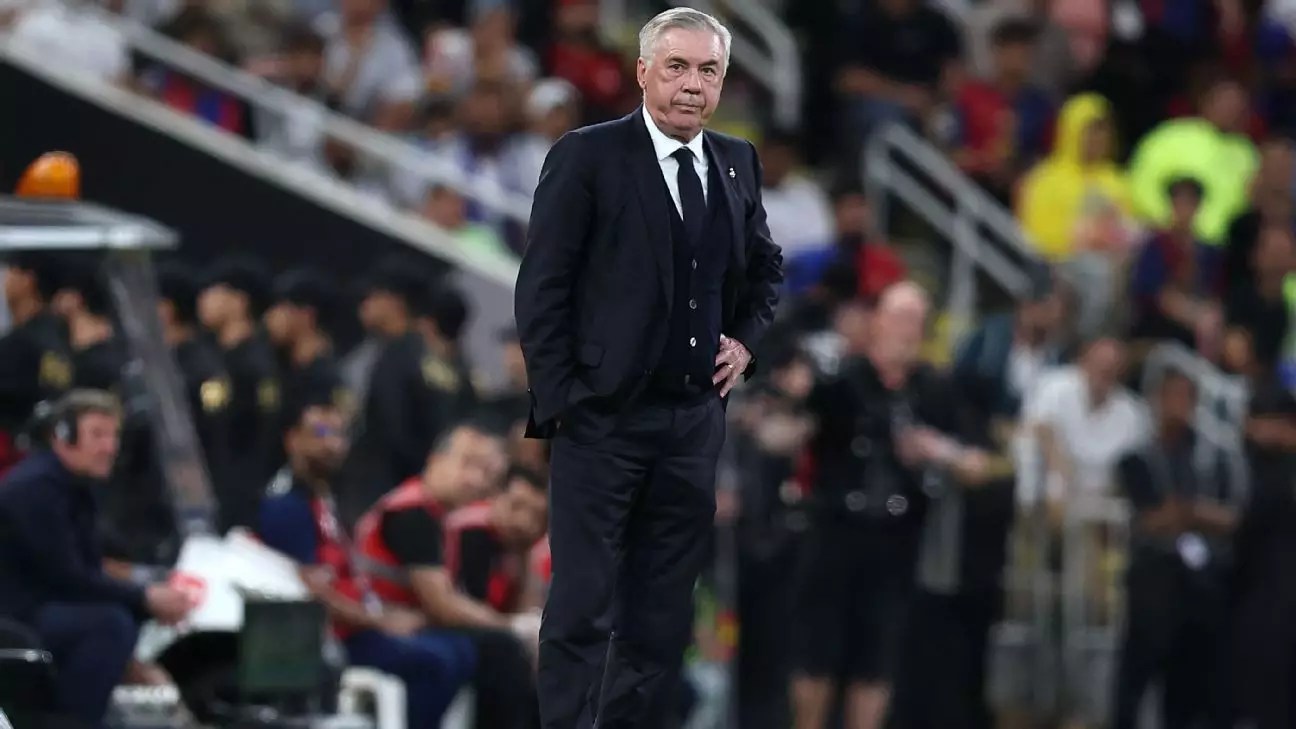Following a disappointing defeat against Barcelona in the Spanish Supercopa, Real Madrid’s head coach, Carlo Ancelotti, convened with club CEO José Ángel Sánchez to evaluate the current situation of the team and discuss possible transfer strategies. While sources described this meeting as routine and devoid of any sense of immediate crisis, it is crucial to recognize the undertones of discontent that have emerged from the team’s performance throughout the season. The club is at a crossroads, plagued by ongoing issues that need to be addressed if they are to reclaim their status as a dominant force in both domestic and European competitions.
Since the onset of the current season, it has become increasingly clear that Real Madrid’s back line has encountered significant challenges. Ancelotti and his coaching staff have expressed the need for bolstering their defense—a concern that has been apparent since the summer transfer window. Although they attempted to bolster their roster with players like Leny Yoro, Madrid ultimately refrained from pursuing adequate reinforcements, which raises questions about the club’s long-term strategic planning. While they did target Alphonso Davies, the decision to respect Bayern Munich’s standing suggests a cautious approach that may not serve the team’s immediate needs effectively.
In light of the recent performance dips and injuries, notably that of Dani Carvajal, Real Madrid has turned their attention toward Trent Alexander-Arnold as a potential signing. However, Liverpool’s swift rejection of their approach indicates that Madrid may need to recalibrate their transfer aspirations as well as their timeline for acquiring new talent. The possibility remains that they may have to bide their time until the summer for a more strategic acquisition.
The injury crises, primarily the setbacks faced by Carvajal and Éder Militão, have exposed the vulnerabilities within Los Blancos’ squad depth. The coaching staff must consider tactical alternatives—such as maximizing the role of Raúl Asencio or switching the play style to accommodate Lucas Vázquez and a potential return of Fede Valverde to the right-back position. These adjustments must not only serve as temporary solutions but also focus on maintaining competitive performance.
Additionally, the return of David Alaba introduces an element of hope, but the uncertainty regarding his form post-injury complicates immediate expectations. The lack of effective rotation in defensive positions has led to an observable decline in team performance, evidenced by their series of defeats against formidable opponents like AC Milan, Lille, and Liverpool.
Despite the mounting pressures and public scrutiny that come with disappointing performances, Ancelotti’s stability and composure are critical in steering the team through turbulent waters. His experience should ideally instill confidence among players and the club’s administration alike. Speaking to reporters, Ancelotti emphasized the importance of not overreacting; a sentiment that acknowledges the narrow margin separating them from current LaLiga leaders Atlético Madrid.
The club must lean on its historical resilience and aim to turn their fortunes around. There’s a latent belief among management that by improving performance metrics during the second half of the season, a LaLiga title remains a feasible goal—even without immediate transfer reinforcements. Yet, to actualize this ambition, the coaching staff must find means to effectively manage player fitness, refine their tactical framework, and maximize their roster’s potential.
As Real Madrid prepares for their Copa del Rey matchup against Celta Vigo, there exists a crucial opportunity for the team to rally and demonstrate their capability to compete despite their setbacks. This encounter could serve as a pivotal moment; a bounce-back victory would not only restore confidence but also signal to both fans and the wider football community that Real Madrid still holds the strength to perform at the highest level.
The combination of strategic decision-making, tactical flexibility, and psychological resilience will determine Real Madrid’s fortune as the second half of the season unfolds. The coming weeks will be integral for both assessing the current squad’s capabilities and the potential for future investments to ensure the club’s championship aspirations remain intact.


Leave a Reply